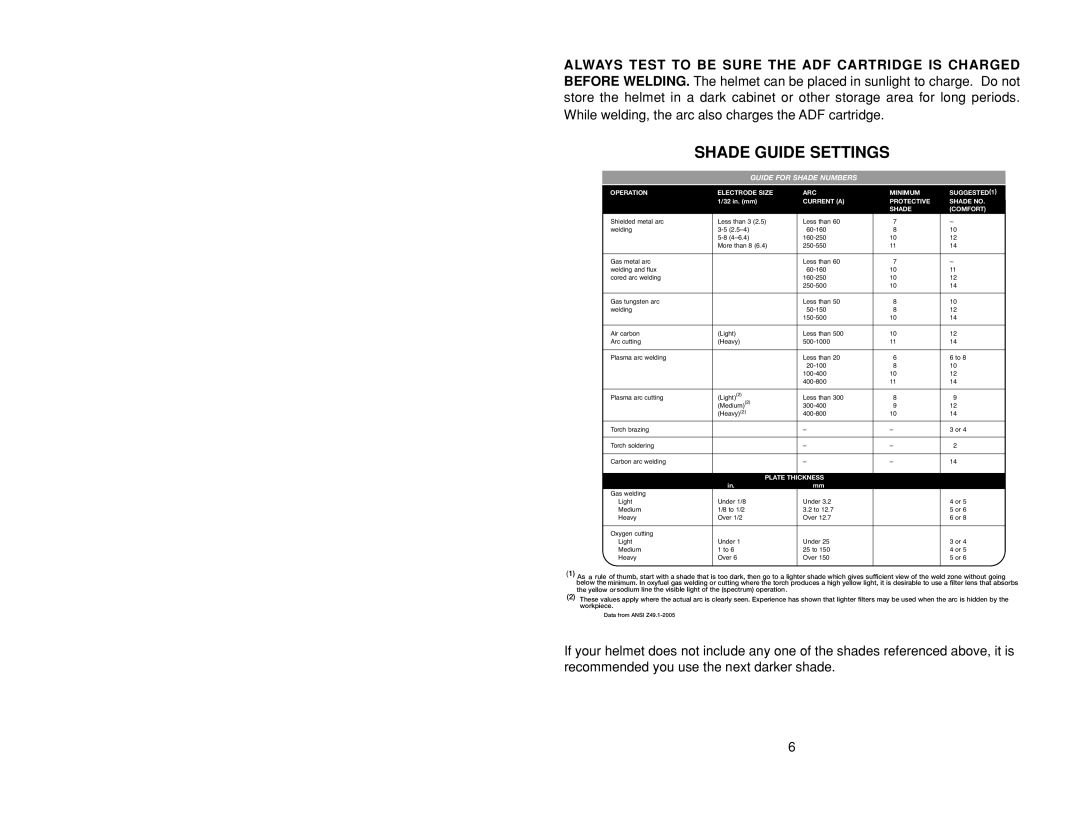
ALWAYS TEST TO BE SURE THE ADF CARTRIDGE IS CHARGED BEFORE WELDING. The helmet can be placed in sunlight to charge. Do not store the helmet in a dark cabinet or other storage area for long periods. While welding, the arc also charges the ADF cartridge.
SHADE GUIDE SETTINGS
GUIDE FOR SHADE NUMBERS
OPERATION | ELECTRODE SIZE | ARC | MINIMUM | SUGGESTED(1) |
| 1/32 in. (mm) | CURRENT (A) | PROTECTIVE | SHADE NO. |
|
|
| SHADE | (COMFORT) |
Shielded metal arc | Less than 3 (2.5) | Less than 60 | 7 | – |
welding | 8 | 10 | ||
| 10 | 12 | ||
| More than 8 (6.4) | 11 | 14 | |
|
|
|
|
|
Gas metal arc |
| Less than 60 | 7 | – |
welding and flux |
| 10 | 11 | |
cored arc welding |
| 10 | 12 | |
|
| 10 | 14 | |
Gas tungsten arc |
| Less than 50 | 8 | 10 |
welding |
| 8 | 12 | |
|
| 10 | 14 | |
Air carbon | (Light) | Less than 500 | 10 | 12 |
Arc cutting | (Heavy) | 11 | 14 | |
|
|
|
|
|
Plasma arc welding |
| Less than 20 | 6 | 6 to 8 |
|
| 8 | 10 | |
|
| 10 | 12 | |
|
| 11 | 14 | |
Plasma arc cutting | (Light)(2) | Less than 300 | 8 | 9 |
| (Medium)(2) | 9 | 12 | |
| (Heavy)(2) | 10 | 14 | |
Torch brazing |
| – | – | 3 or 4 |
|
|
|
|
|
Torch soldering |
| – | – | 2 |
|
|
|
|
|
Carbon arc welding |
| – | – | 14 |
|
|
|
|
|
|
| PLATE THICKNESS |
| ||
Gas welding | in. |
| mm |
| |
Under 1/8 |
| Under 3.2 |
| 4 or 5 | |
Light |
|
| |||
Medium | 1/8 to 1/2 |
| 3.2 to 12.7 |
| 5 or 6 |
Heavy | Over 1/2 |
| Over 12.7 |
| 6 or 8 |
|
|
|
|
|
|
Oxygen cutting | Under 1 |
| Under 25 |
| 3 or 4 |
Light |
|
| |||
Medium | 1 to 6 |
| 25 to 150 |
| 4 or 5 |
Heavy | Over 6 |
| Over 150 |
| 5 or 6 |
|
|
|
|
|
|
(1) As a rule of thumb, start with a shade that is too dark, then go to a lighter shade which gives sufficient view of the weld zone without going below the minimum. In oxyfuel gas welding or cutting where the torch produces a high yellow light, it is desirable to use a filter lens that absorbs
the yellow or sodium line the visible light of the (spectrum) operation.
(2)These values apply where the actual arc is clearly seen. Experience has shown that lighter filters may be used when the arc is hidden by the workpiece.
Data from ANSI
If your helmet does not include any one of the shades referenced above, it is recommended you use the next darker shade.
6
